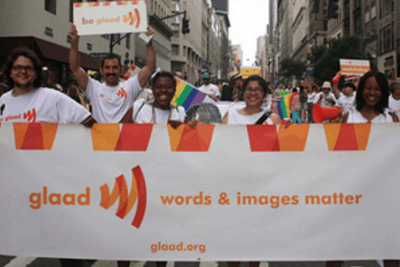Last year, GLAAD, a national LGBT media advocacy organization, undertook its first Accelerating Acceptance study, the report from which it released in February 2015. The numbers were not surprising: the study—a survey fielded from November 10-12, 2014 among 2,010 adults, including 1,821 non-LGBT participants—revealed significant levels of discomfort among non-LGBT people with their LGBT coworkers and neighbors.
Slightly less than a year later, from October 5-7, 2015, a second survey was given to 2,032 adults, including 1,781 non-LGBT participants. The results show a significant change in the discomfort these non-LGBT participants reported they would feel on encountering LGBT people [see the chart below].
Despite many positive changes in attitudes highlighted, however, the poll illustrates that there remains a startling level of complacency and ambivalence among Americans on LGBT issues. A number of key findings emerged.
Perhaps because marriage equality was so widely covered by the media in 2015, half (50%) of all non-LGBT Americans are now under the false and potentially dangerous impression that ‘gay people have the same rights as everybody else,’ the study showed. LGBT rights may not seem an urgent issue for allies under this false impression. This has serious repercussions for the LGBT rights movement, since LGBT people may still legally suffer serious consequences because of their identity in this country.
Further, the study indicates that many Americans are unconcerned by or unaware of LGBT issues. Roughly a third of non-LGBT Americans profess no strong opinion about important LGBT issues. Interestingly, this ambivalence appears across segments, including allies.
Over a quarter (27%) of non-LGBT Americans say that violence against transgender people is not a serious problem, despite the fact that at least 21 transgender women, mostly women of color, were murdered in the U.S. in 2015.
Similarly, 37% of non-LGBT Americans say that homelessness among LGBT youth is not a serious problem. According to The Williams Institute at UCLA, however, approximately 40% of all homeless youth identify as LGBT. As the struggle to house Nashville’s LGBT youth since the closure of the OASIS Center’s shelter has highlighted, not only do LGBT youth represent a disproportionate share of youth homelessness, but their identities pose special difficulties, making traditional solutions less effective or more dangerous.
“Complacency is the enemy of social progress,” said GLAAD CEO & President Sarah Kate Ellis. “2015 was a monumental year for the LGBT community, but marriage equality is a benchmark–not a finish line. The hard work of legislative change must go hand in hand with that which cannot be decided in a courtroom: changing hearts and minds.”
And despite issues of complacency, the growing comfort of Americans with LGBT people is a promising marker for the political future of LGBT rights as an issue. The second study shows that Americans are also growing more comfortable with LGBT people.
In six out of seven situational questions surveyed, Americans report less discomfort with LGBT people than was reported the previous year. In fact, the percent who reported being very or somewhat uncomfortable seeing a same sex couple holding hands fell by 7% in just one year. Thus the normalization of and acceptance for LGBT people, not just in principle but in public, seems to be proceeding at a rapid pace.
More information and the full report may be found at glaad.org/acceptance.
